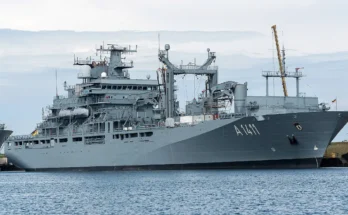Half a century has passed since that first trip to the Amazon which changed Martin von Hildebrand’s life forever (New York, 1946). The Colombian anthropologist, who since 1971 has dedicated his life to defending the territorial rights of indigenous populations – he helped obtain legal protection for 260,000 square kilometers – and to the preservation of the world’s largest rainforest, has been secretary general of the Amazon Cooperation Treaty Organization (ACTO) for a year, which brings together the governments of the eight countries that share the threatened biome. In this interview conducted in Belém (Brazil), in the framework of COP30, he addresses the riches and challenges of the Amazon.
Ask. The Amazon is almost as big as Australia. How can you explain to someone who has never set foot there how different it is?
Answer. It’s pure diversity. And the human beings who live here have imitated that world, something difficult for us to understand, who are a monoculture, a religion, a culture, a language… For them diversity is in the way of cultivating the land, in food, in marital relationships. It is a strength because it allows you to be creative, innovative.
Q. What is the political significance of holding COP30 in the Amazon, of bringing the politicians and technicians who define global environmental policy?
R. It is very important that they become aware. The Amazon biome is absolutely essential to the planet. One hectare of jungle produces, evaporates and transpires seven times more than one hectare of sea. 22,000 million tons per day rise into the sky and return through the rushing rivers, which run from the Andes to the Río de la Plata. And that’s where agriculture and cities live. Our problem is not lack of information or money. The big problem is having good plans to create solutions that complement each other: security, deforestation, economic alternatives…
Q. And what does the summit mean for Amazonians?
R. I see them proud. They feel that the world, which had forgotten them a little, is watching them. It is your opportunity to get more political space and more responses from governments, social organizations and companies to your needs and rights.
Q. One of the challenges to preserving the forest is that legal activities are more profitable than illegal ones (poaching, hunting, fishing and illegal logging…). What is the way to reverse it?
R. Difficult question. Controlling what is illegal is not just about the police and the army; It’s justice, local governance. It’s not enough to do something that earns more than cocaine or gold. The normal citizen does not look for luck, but for alternatives, the necessities, an income, education, health. Covering basic needs works, but there are no alternatives.
Q. Why is it complex or why hasn’t it been researched?
R. The vision of the Amazon is shaped from the outside, around economic exploitation. The locals were not listened to. If we want solutions, we need to understand how they live, and solutions need to come from a common vision. It’s not enough to distribute the benefits, you have to sit at the table where decisions are made. The people of the Amazon have knowledge on how to manage the jungle, they have proposals, but they must be listened to. We have a habit of believing that indigenous people or the poor don’t know. And it turns out he knows a lot more than we do because he’s there. They must also be counted on to address what is illegal. And keep in mind that it’s part of an international dynamic.
Q. Even politicians admit that international cooperation between organized criminal gangs is more fluid than between governments in the region.
R. Where is the drug purchased? In countries that have money, in the north. And who buys gold? Where do mining chemicals come from? If we don’t understand the relationship between the parties and reach a common commitment, it won’t work. The same for time, for everything.
Q. What is the most pressing challenge in the Amazon?
R. Security. Because it has infiltrated the entire region and it is very difficult to enter with environmental solutions, new economies, health programs…
Q. Are you referring to organized crime? For example, the Red Command, the target of the operation that left 121 dead in Rio de Janeiro, controls the Amazon River route.
R. Many times it is the people who work for crime who are attacked, not the bosses. And the information exists. As they say, kill the snake by the head. And the other big problem, of course, is the point of no return, savannization.
Q. Explain what it means.
R. In the Amazon, under the canopy of the trees, we generally have around 27 degrees of temperature. About 2,500 millimeters of rain fall per year, and summer, the season without rain, lasts 2 to 3 weeks. In the Amazon we live at 30 degrees, the rain decreases and summer lasts one or two months. Controlling it is not easy, but all countries are committed to stopping deforestation. But it depends a lot on security. Brazil has made a lot of progress. Colombia is committed.
Q. Bolivia has huge bald patches in the Amazon.
R. Yes, there is a verbal commitment and. And it is also essential to restore vegetation in places that strengthen its functioning.
Q. Savanization means that the Amazon would stop absorbing carbon and emitting it, what was a solution becomes a problem.
R. And it also stops producing water and this is a serious problem. And by losing biodiversity it no longer has resilience, that is, it no longer recovers as before. But, even if we did so divinely, we will not save the jungle if global warming continues. Here we contribute 1.4% of emissions. It’s not about emphasizing one or the other. If we don’t do this together, we won’t move forward.
Q. And now that the United States has left the Paris Agreement, what prospects do climate negotiations have?
R. We need the strong commitment of European countries, of China.
Q. After more than half a century dedicated to the Amazon, do you feel more optimistic or pessimistic?
R. I am neither an optimist nor a pessimist. I know you have to fight, win or lose because the problem exists and you have to try to solve it. This has been my life and it hasn’t been bad for me. Now, this is a big deal, but there is hope. I hope that we become aware, like the indigenous people, that we coexist with nature as if it were a member of the family, in a relationship of care and reciprocity.
Q. How are Amazonian countries collaborating?
Q. They have the will, they collaborate, but these are relatively recent steps, we are in transition. And it varies from one country to another. We have joint fire and water management programs, special safety commissions, climate and environmental commissions, and health commissions. It takes time, but there is a commitment, including financial.



